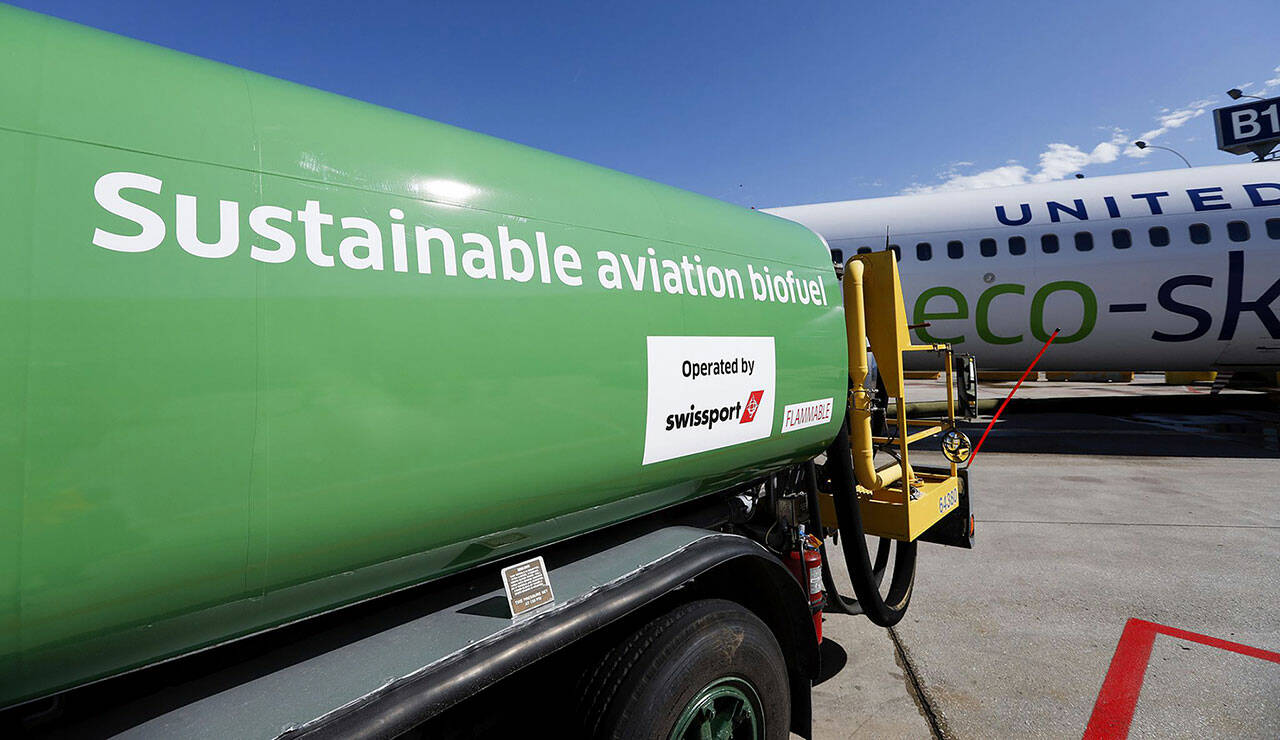EVERETT — The Boeing Co. will deliver 2 million gallons of sustainable aviation fuel — made from agricultural waste products — to the fuel farms it maintains at the Paine Field, Renton and South Carolina airplane assembly plants.
To date, it is the largest sustainable aviation fuel purchase by a commercial aircraft manufacturer, Boeing said.
The fuel, a blend of 30% sustainable fuel and 70% conventional fuel, will be used to power some test flights, production flights and airplane delivery flights at the Everett assembly plant and other locations, the company said.
Boeing purchased the fuel from EPIC Fuels, an independent aviation fuel supplier with operations in the United States and Canada.
Sustainably produced jet fuel can reduce carbon dioxide emissions — a greenhouse gas — by as much as 80% per gallon, EPIC said.
The global aviation industry is currently responsible for generating about 2% of carbon emissions, as well as 12% of all transportation emissions, according to the Environmental Protection Agency.
“Our focus on environmental stewardship and safety is well known in the industry,” said Kyle O’Leary, vice president and chief operating officer of EPIC Fuels. “EPIC and Boeing have been partners for decades and we are honored to be a part of this procurement. Working together, we are making sustainability more attainable for our customers.”
Sheila Remes, Boeing vice president of environmental sustainability, said sustainable fuels are the “best short-term solution” to reduce the aviation industry’s carbon emissions.
“They can be dropped into the existing ecosystem — the airport, the fuel farm or the airplanes,” Remes told The Daily Herald.
Sustainable fuel can be blended with traditional jet fuel without having to modify existing airplanes, engines or fuel pipelines, Remes said. It also produces fewer particulates than conventional jet fuel, which is “good for the community,” she added.
The nation’s aviation industry recently resolved to achieve net-zero carbon emissions by 2050.
To aid in that effort, Boeing last year committed to producing commercial airplanes that are capable of flying on 100% sustainable fuel by 2030.
Sustainable, low-carbon fuel is typically produced from agricultural residue, including waste fats and oils.
But so far, a limited supply of the fuel and its higher cost are barriers to more widespread use.
Cost can vary, but sustainable fuel is about twice the price of conventional aviation fuel, Remes said.
The development of alternative aviation fuels is a growing industry.
Boeing has partnered with private companies and NASA to develop alternative fuels and electric aircraft.
Fully electric airplanes and hybrid models appear promising. However, their development is still in its infancy, and the effort is focused on small, commuter aircraft with a range of 500 miles or less.
While half of all commercial flights are 500 miles or less, those short flights account for just 15% of the airline industry’s fuel consumption, Remes said.
The day when a larger commercial airplane takes off and flies on battery power or hybrid-electric power is decades away.
Sustainable fuels are key to long-term, large-scale carbon dioxide emission reductions that airplane technology has not yet achieved, Remes said.
EPIC Fuels also supplies custom blends that are up to 100% sustainable fuel for the Boeing ecoDemonstrator program, which tests promising aviation-related technologies.
In 2018 the program, in partnership with FedEx, conducted the industry’s first 100% sustainable aviation fuel commercial airplane test flight, with a Boeing 777 freighter.
Boeing began making sustainable fuel test flights in 2008.
By 2012, with federal regulators’ approval, Boeing began making some airplane delivery flights using sustainable fuels. In 2019, the jet manufacturer began offering customers the option of having their airplanes delivered using a sustainable fuel blend.
Sustainable aviation fuel is currently approved by federal regulators for up to a 50%-50% blend of sustainable and conventional jet fuel for commercial flights. But Boeing plans to work with federal regulators and other stakeholders to raise the blending limit.
In a separate effort aimed at eliminating the use of leaded fuel by 2030 in the light general aviation community, the Federal Aviation Administration outlined four “pillars of action” last month to achieve the goal. The effort encompasses the FAA, the Environmental Protection Agency, fuel suppliers, airports, aircraft and engine manufacturers, and other stakeholders. FAA Administrator Steve Dickson called the effort a “safe and practical path to a lead-free aviation system.”
At the University of Washington, researchers hope to produce sustainable aviation fuel from leftover agricultural biomass sources, such as wheat straw, corn harvest remnants and poplar wood grown on tree farms.
“Airlines are eager to lower their carbon footprint,” said Rick Gustafson, a UW biofuels researcher. “However, aviation fuel is a challenging product to produce since airlines need to keep their fuel costs low and the fuel has stringent technical requirements to be safe.”
Janice Podsada; jpodsada@heraldnet.com; 425-339-3097; Twitter: @JanicePods.
Talk to us
> Give us your news tips.
> Send us a letter to the editor.
> More Herald contact information.

























